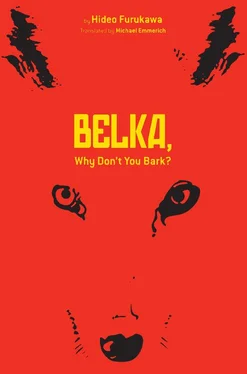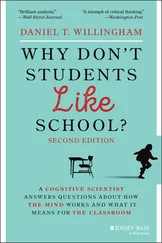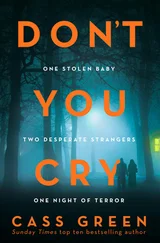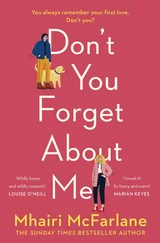Hideo Furukawa - Belka, Why Don't You Bark?
Здесь есть возможность читать онлайн «Hideo Furukawa - Belka, Why Don't You Bark?» весь текст электронной книги совершенно бесплатно (целиком полную версию без сокращений). В некоторых случаях можно слушать аудио, скачать через торрент в формате fb2 и присутствует краткое содержание. Город: San Francisco, Год выпуска: 2012, ISBN: 2012, Издательство: Haikasoru, Жанр: prose_magic, Современная проза, на английском языке. Описание произведения, (предисловие) а так же отзывы посетителей доступны на портале библиотеки ЛибКат.
- Название:Belka, Why Don't You Bark?
- Автор:
- Издательство:Haikasoru
- Жанр:
- Год:2012
- Город:San Francisco
- ISBN:978-1-4215-5089-3
- Рейтинг книги:4 / 5. Голосов: 1
-
Избранное:Добавить в избранное
- Отзывы:
-
Ваша оценка:
- 80
- 1
- 2
- 3
- 4
- 5
Belka, Why Don't You Bark?: краткое содержание, описание и аннотация
Предлагаем к чтению аннотацию, описание, краткое содержание или предисловие (зависит от того, что написал сам автор книги «Belka, Why Don't You Bark?»). Если вы не нашли необходимую информацию о книге — напишите в комментариях, мы постараемся отыскать её.
https://www.youtube.com/watch?v=ay_DcZ6RDFA https://www.youtube.com/watch?v=Orvqrqjk9pU
Belka, Why Don't You Bark? — читать онлайн бесплатно полную книгу (весь текст) целиком
Ниже представлен текст книги, разбитый по страницам. Система сохранения места последней прочитанной страницы, позволяет с удобством читать онлайн бесплатно книгу «Belka, Why Don't You Bark?», без необходимости каждый раз заново искать на чём Вы остановились. Поставьте закладку, и сможете в любой момент перейти на страницу, на которой закончили чтение.
Интервал:
Закладка:
The human twentieth century continued, that summer, as though Anno Canis didn’t exist.
You cried.
Nameless, gazing straight up at the moon, you were pained. Your eyes hurt. You had been born underground, where vision was useless, and the moonlight was too strong for you. Tears welled in your eyes. Tears fell. But you didn’t look away.
You kept staring up at the moon, overwhelmed.
You sensed something behind you.
You turned around. Your eyesight still blurred by tears.
It was a human. He held a night vision device in one hand and a military map in the other. He was different from all the other humans you had seen… spied on… so far. There was a difference in race—in build, in odor—but of course that meant nothing to a dog like you. You were on the edge of a firebase to the north of the DMZ, an area that was on the front lines but which had been cleared of North Vietnamese soldiers.
You were unsure how to react.
Because instinct told you there was no need to run.
WHAT IS… WHAT…?
You, nameless dog, were at a loss. How could a human do what he was doing, stand there opposite you as he was, in the darkness?
The human spoke: “Are you crying?”
His voice sounded like a dog’s whine. It radiated through your body with the same warmth as the commands the unnameable sense issued. You had no way of knowing, of course, but the language the man spoke was not Vietnamese. Neither was it Chinese. Or English.
WHAT IS IT, HUMAN?
“I saw you,” the human said. Then, holding up the night vision device, “I saw you with this. Crawling up out of the ground. Like the earth was giving birth to you. You were looking up at the moon.”
ARE YOU A GUIDE? you thought, your vision clouded with tears. A GUIDE TO THIS OTHER WORLD?
“You’re the opposite of those dogs who returned from outer space. But not unrelated. And look at that physique of yours… you’re purebred, huh? Purebred German shepherd? You don’t look that old either. Young, in fact. You’ve just graduated from puppyhood.”
HEY, HUMAN, you say. THIS IS A GREAT, MYSTERIOUS WORLD.
“Strange… are you an American dog?”
I CAME ABOVEGROUND.
“They set you loose in the tunnels to explore them in secret, and you got lost—is that it? No, it can’t be. You don’t have that kind of attitude at all. Are you Chinese, then? One of the dogs in that platoon they talk about, the one they say the PLA sent in four years ago? No… that’s not right either.”
YOU WERE HERE.
“Anyway, I was here, and then you turned up,” the human said. He spoke the same words, dog, nameless dog, that you yourself had just said. Not in Vietnamese, or in Chinese, or even in English. In Russian.
“Come. I’ll take you with me. Can your children be the next Belka, the next Strelka?”
The KGB officer held out his hands, and you barked. Woof!
In March 1969, the Sino-Soviet split finally escalated into armed conflict. The two armies exchanged serious gunfire in the area around Zhenbao, aka Damansky Island, in the Ussuri River, on the border between the nations. In June a similar border dispute broke out along the edge of Xinjiang Province, and in July the same thing happened around Bacha Island, aka Gol’dinskii, in the Heilong River. The participants in the conflicts were always border guard troops. The tension had been building for some time. In 1967, as China was pressing ahead with the Great Cultural Revolution, the Red Guard attacked the Russian Embassy in Beijing. They set fire to effigies of Soviet leaders. A more offensive demonstration would not have been possible. And did this shift in Sino-Soviet relations have an effect on the Vietnam War? Of course. As if the Vietnam War weren’t already chaotic enough. In June 1965, the USSR and the Democratic Republic of Vietnam signed two agreements concerning “free Soviet aid in the development of the national economy of the DRV” and “strengthening the DRV’s defensive capabilities.” Just one month after the PLA marched through Friendship Pass to provide secret aid to Ho Chi Minh’s Vietnam, the Soviet Union and Vietnam were building a new relationship. Ho’s health went into a decline that year, and the party secretary took control. The USSR exploited this shift to try, in a variety of ways, to chip away at the Sino-Vietnamese friendship. During the first half of the Vietnam war—America’s quagmire—the world’s two great communist powers were in fact engaged in a tug-of-war, each trying to attract that small communist country, North Vietnam, to their side. In the end, Vietnam chose the USSR.
History revealed itself almost prophetically. On September 3, 1969, Ho Chi Minh died. Just like that, the personal relationship he and Mao Zedong had cherished was over. And by then Vietnam had already made its move. It chose to leave China, move closer to the USSR. Fully fifty percent of the aid that poured into North Vietnam from communist countries in 1968 came from the Soviet Union. This aid didn’t only take the form of weapons; the USSR actually put feet on the ground. It sent military advisors to the Indochina peninsula, to the front. The series of “Sino-Soviet conflicts” in March and June 1969 led the Soviets to include a large number of officers from the Border Guard among these specialists. The men on the ground weren’t only specialists in fighting, they were specialists in fighting and maneuvering against China.
And so a certain Russian KGB officer found his way, that summer, to that spot.
Or could it be… that it was your history, dogs, that called him there?
Could it be?
Dogs, dogs, where will you bark next?
Woof, woof!
1975: one dog was in Hawaii, one was in Mexico. To be precise: one bitch was on the island of Oahu, at the twenty-first parallel north, and one male was in Mexico City, at the twentieth parallel north. Their names were Goodnight and Cabron. Goodnight was a purebred German shepherd; Cabron was a mongrel whose father had been a purebred boxer—who had sprung, that is to say, from boxer seed. Goodnight’s origins have already been discussed. Her brother, DED, died in 1968, underground, on the Indochina peninsula, at the seventeenth parallel north. His neck had been torn open by a dog belonging to the PLA Military Dog Platoon, a dog descended from Jubilee. Jubilee had been the aunt of Goodnight and DED’s great-great-great-grandfather, five generations earlier. Okay. What of Cabron, the mutt in Mexico City? Where did he spring from?
It’s complicated.
Cabron wasn’t descended from Bad News. But if you were to trace his line back through his mother’s side, you would find that, in a way, he was directly descended from Bad News. Four generations earlier, Cabron’s great-great-grandmother had had six maternal aunts and uncles. Cabron’s great-great-grandmother’s mother and her six siblings—a litter of seven in total, each dog entirely different in appearance from the rest—had basked in the love of two mothers. The first was their birth mother. She had suckled them for the first half month of their lives. Their second mother was the one who raised them. She, too, had suckled them for a few weeks, until the time came for them to be weaned off her milk. Their birth mother’s pregnancy with them had been her fourth. Her name was Ice; her father had been a Hokkaido dog, her mother was a Siberian husky, and one of her grandmothers had been a Samoyed. The Hokkaido dog was Kita, of course. Their adoptive mother had given birth several times before she took charge of the seven puppies, but after that she never gave birth again. She was a lovely purebred German shepherd, and her name was Sumer. She was Bad News’s child.
And she was Jubilee’s sister.
Sumer became the mother of the seven puppies Ice had given birth to in 1957. Year zero Anno Canis. In October of that year, the mother and her children had entered the area around the Mexican-American border. They had been brought in to serve as guard dogs on the property of a certain prominent Mexican-American who ran an orchard there. That wasn’t all this man ran, though: the Don, as they called him, was the head of a family with another, secret face. He was the boss of a criminal organization that specialized in smuggling. His partners in business all lived on the other side the border, to the south… in Mexico. Or at least they did in the 1950s. Time passed. By now the Don was the old Don, and Sumer had lived out her allotted years. What happened to the prominent family’s secret trade? And what happened to the dogs?
Читать дальшеИнтервал:
Закладка:
Похожие книги на «Belka, Why Don't You Bark?»
Представляем Вашему вниманию похожие книги на «Belka, Why Don't You Bark?» списком для выбора. Мы отобрали схожую по названию и смыслу литературу в надежде предоставить читателям больше вариантов отыскать новые, интересные, ещё непрочитанные произведения.
Обсуждение, отзывы о книге «Belka, Why Don't You Bark?» и просто собственные мнения читателей. Оставьте ваши комментарии, напишите, что Вы думаете о произведении, его смысле или главных героях. Укажите что конкретно понравилось, а что нет, и почему Вы так считаете.












